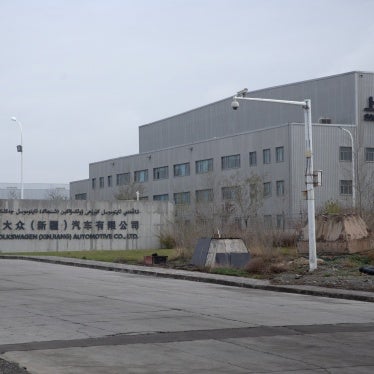On October 25, 2019, the United States Trade Representative (USTR) announced that the U.S. government would suspend $1.3 billion in trade preferences for Thailand under the Generalized System of Preferences (GSP) based on its “failure to adequately provide internationally-recognized worker rights… such as protections for freedom of association and collective bargaining”. GSP program eligibility will be revoked for 573 products in six months’ time, giving Thailand a unique opportunity to make important reforms and have the trade benefits reinstated.
For two decades, many of the organizations now active in the Seafood Working Group have been calling on the Thai government to stop egregious labor abuses and end limits on internationally recognized worker rights. The undersigned groups strongly urge the Thai government to seize this opportunity and undertake the necessary reforms to foster a legally enabling environment for safe and decent work.
As Thailand is the largest beneficiary of the U.S. GSP program worldwide, Thai businesses have been reaping enormous financial benefits from this program. Yet, the Thai government has not met the labor rights requirements needed to receive those benefits. Mandatory criteria for GSP program eligibility include taking steps to afford internationally recognized worker rights to all workers. The USTR has been closely monitoring Thailand’s progress since 2013 based on several petitions submitted by the American Federation of Labor and Congress of Industrial Organizations (AFL-CIO) and, in 2015, Thailand was warned of its failure to meet the eligibility criteria with respect to freedom of association, collective bargaining, acceptable conditions of work, and forced labor. As Thailand has failed to make sufficient progress over the past six years, the USTR decided to enforce the labor rights conditionality of the GSP program.
The USTR decision to suspend trade benefits focuses on repression and denial of fundamental labor rights of all workers in Thailand, not only on the abuse of migrant workers. Approximately 80% of Thailand’s 39 million workers are not guaranteed full rights to freedom of association and collective bargaining under law, as public sector, informal, temporary, and seasonal agriculture and sub-contracted workers are not permitted to form or join unions whatsoever. Thailand has a trade union density of 1.6 percent, among the lowest of any country in Southeast Asia. Complaints submitted to the ILO over the past decade show Thai trade unionists are routinely discriminated against and are vulnerable to employer retaliation for union participation. Workers are regularly dismissed for attempting to register unions or for submitting demands to bargain collectively. Union leaders face legal and judicial harassment, with companies using courts to seek damages over alleged financial losses for union activity, bankrupting these individuals and discouraging other workers from signaling abuse or seeking remedy. At this time, the Thai government is criminally prosecuting State Railway Union of Thailand (SRUT) leaders for organizing a health and safety initiative to address problems that workers believe contributed to a deadly train derailment in 2009.
Members of the Seafood Working Group and other organizations have consistently documented labor rights abuse and forced labor of migrant workers in the seafood industry in Thailand. We have demonstrated links between such exploitation and the continuing legal discrimination against migrants, such as the denial of their fundamental rights to freedom of association and collective bargaining. The country’s estimated four million migrants from neighboring Southeast Asian nations – 10 per cent of the country’s workforce and comprising a majority in several low wage industries – are legally barred from forming unions or serving as union leaders. This is particularly problematic in migrant-dominated labor sectors, such as seafood processing and fishing, since there are almost never existing unions who could represent migrants’ interests. As the ILO and other organizations concerned with business and human rights have repeatedly explained, such restrictions prevent migrant workers from being able to actively defend their interests and leave them vulnerable to exploitation. When migrants do speak out against abuse, companies have charged them with criminal defamation, thereby violating rights to freedom of expression, and courts have agreed to hear the charges.
Following the USTR announcement, major seafood exporters Thai Union Group and Charoen Pokphand Foods announced that the trade preferences change would have no material impact on their business operations because their main exports, tuna products, were not covered under Thailand’s GSP program. Notwithstanding which specific seafood products are directly impacted by the USTR’s decisions, these egregious labor abuses are present across the Thai economy. Leading seafood companies and international buyers – particularly members of the Seafood Task Force – should be sending a clear message to the Thai government and all other seafood companies in Thailand – that now is the time to guarantee full rights to freedom of association and collective bargaining for all workers and end legal discrimination against migrant workers and limits on their fundamental rights. As per the UN Guiding Principles on Business and Human Rights, corporations have a responsibility to respect internationally recognized rights independently of a country’s willingness to fulfill their own human rights obligations. This corporate responsibility exists over and above compliance with national laws. Until these core rights are ensured to workers, forced labor will remain prevalent.
The Thai government has six months’ time, until April 25, 2020, to make changes to become eligible for trade privileges again in 2021. The Seafood Working Group strongly urges the Thai government and all relevant companies, especially those in the Seafood Task Force, to act quickly and support meaningful reforms that are long overdue.
The Thai government should:
- Reform the Labor Relations Act and the State Enterprise Labor Relations Act to allow all workers, without distinction, the right to form and lead unions, to collectively bargain, and to strike. The law should afford legal protection for those rights so that workers can exercise them without fear or retribution.
- Decriminalize defamation under both the Penal Code and Computer Crime Act and enact anti-Strategic Litigation Against Public Participation (SLAPP) legislation to ensure that that workers and labor rights defenders are not subjected to criminal or civil liability for exercising rights to freedom of expression and speaking out about labor rights abuse.
- Work together with independent and representative unions and worker organizations to address legal loopholes contributing to worker exploitation and reform laws as needed to adequately protect internationally recognized worker rights and prevent labor exploitation.
- Resolve all cases of labor rights violations documented by reports from the ILO Committee on Freedom of Association and GSP petitions to the USTR from the AFL-CIO.
- Ratify ILO Conventions 87 (Freedom of Association) and 98 (Right to Organize and Collectively Bargain).
The companies exporting and sourcing seafood products from Thailand, particularly members of the Seafood Task Force, should also do their part by exercising their leadership and influence.
- International buyers should call publicly on the Thai government to reform relevant labor legislation, including the Labor Relations Act and the State Enterprise Labor Relations Act, to ensure all workers are fully guaranteed internationally recognized rights to freedom of association and collective bargaining.
- International buyers should ensure that suppliers communicate to all workers and their representatives about their rights to freedom of association and collective bargaining. Suppliers should recognize independent and representative worker organizations formed in their workplaces (including migrant worker organizations) and negotiate collective bargaining agreements with them in good faith. Workers should not be terminated or face other retaliation for submitting a request to bargain collectively with employers.
- Through collaborative efforts with suppliers, international buyers should conduct due diligence of their operations in line with the requirements of the UN Guiding Principles on Business and Human Rights, publicly release the results, and take all steps necessary to prevent and remedy abuses of all workers’ rights in their operations.
Sincerely,
American Federation of Labor and Congress of Industrial Organizations (AFL-CIO)
Be Slavery Free
Business & Human Rights Resource Centre (BHRRC)
Center for Alliance of Labor and Human Rights (CENTRAL)
Environmental Justice Foundation (EJF)
Ethical Trading Initiative (ETI)
Finnwatch
Freedom Fund
Freedom United
Foundation for Education and Development (FED)
Greenpeace
Green America
Human Rights and Development Foundation (HRDF)
Human Rights at Sea
Human Rights Watch
Humanity United Action
International Labor Rights Forum (ILRF)
Migrant Workers Rights Network (MWRN)
Migrant Working Group (MWG)
Oxfam
State Enterprise Workers’ Relations Confederation (SERC)
Thai Labour Solidarity Committee (TLSC)
The Civil Society Organization Coalition for Ethical and Sustainable Seafood (CSO Coalition)
United Food and Commercial Workers International Union (UFCW)








